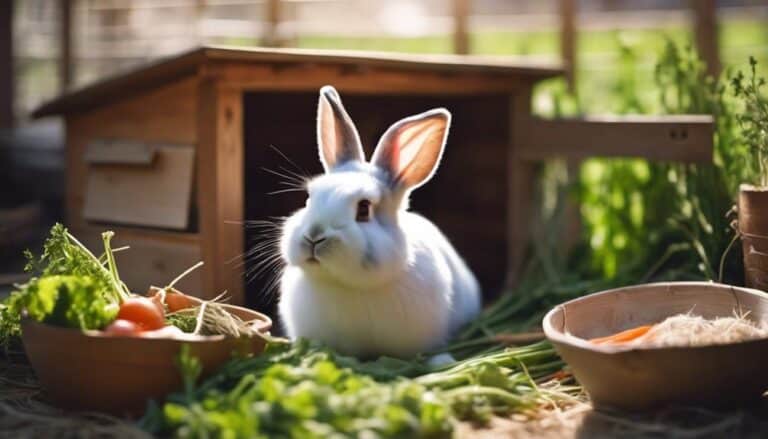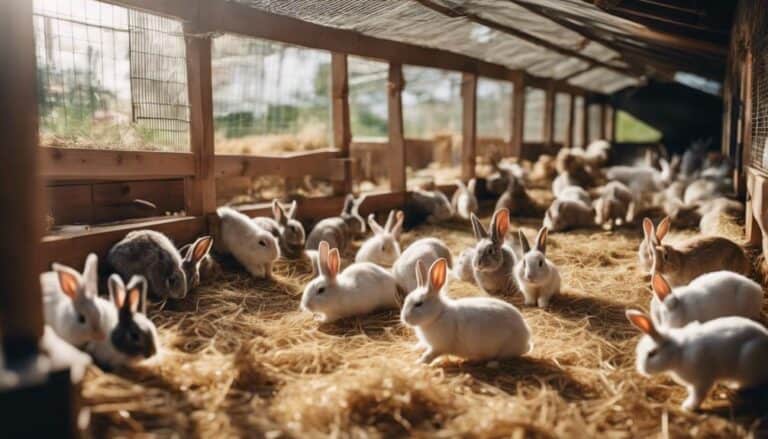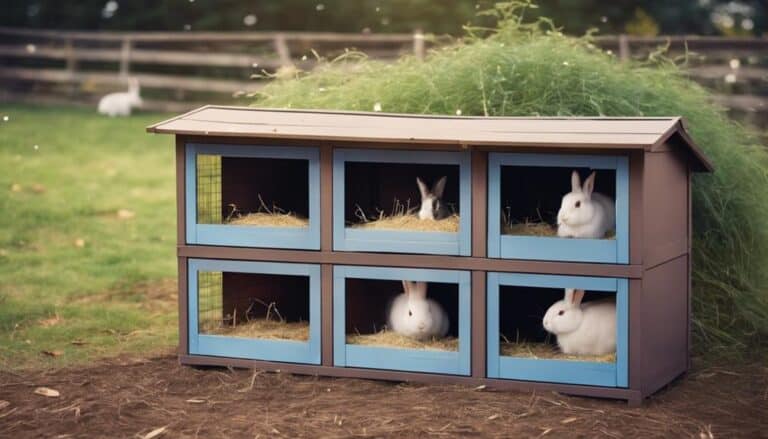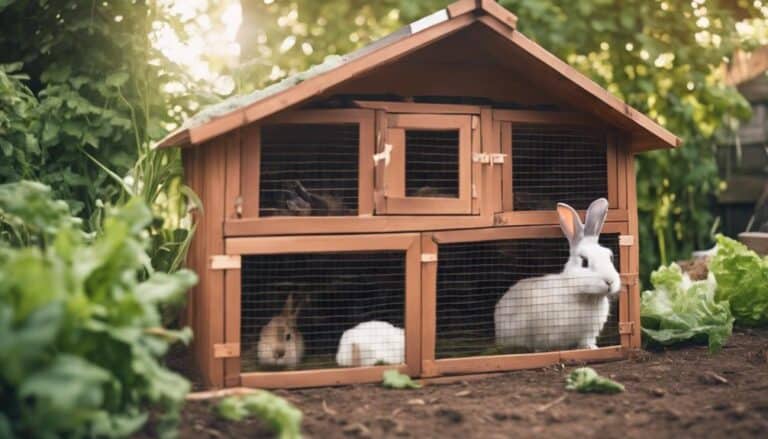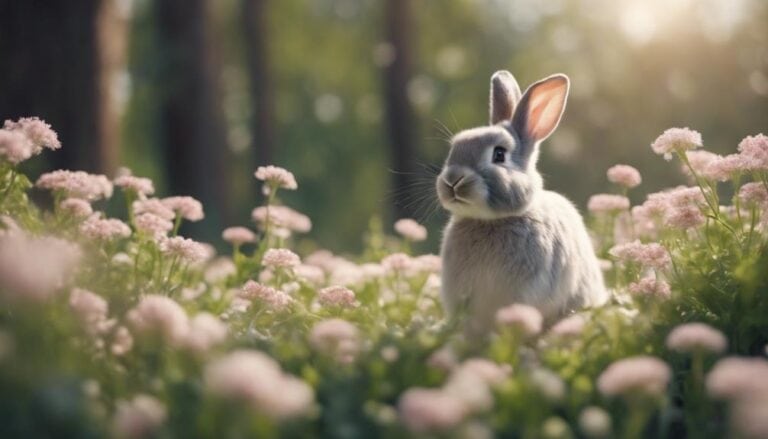Imagine a delicate flower blooming in a neglected garden, slowly wilting away until a caring hand nurtures it back to life. Just like that flower, the bunnies at Happy Hops need your support to thrive and flourish.
The journey towards nurturing these adorable creatures is not just about providing them with food and shelter; it's about understanding their unique needs and forming a deep bond that transcends mere companionship.
Ready to discover the key to fostering a happy and healthy bunny?
Contents
Key Takeaways
- Provide spacious, stimulating environments for bunny well-being
- Ensure balanced nutrition with hay, greens, and pellets
- Regular grooming and dental care are essential for bunny health
- Prioritize preventive measures like spaying, microchipping, and veterinary care
Bunny Enclosure Essentials

Wondering what essentials are needed to create the perfect bunny enclosure for your furry friend's happiness and well-being?
When it comes to rabbit care, providing a spacious living area is essential for their overall health. Make sure your bunny has at least 30 by 36 inches of space to move around, stretch, and explore comfortably. Opt for a large enclosure that offers separate sections for activities such as eating, resting, and playing to cater to your rabbit's needs.
To keep your bunny happy and healthy, include fresh hay for foraging, interactive toys for mental stimulation, and hiding spots for security and comfort. Mimicking their natural instincts, provide appropriate bedding and structures for digging and burrowing.
Creating a stimulating environment in the enclosure is important for the overall well-being and happiness of your pet rabbit. By focusing on these key elements, you can guarantee your bunny has a secure and enriching space to thrive in.
Proper Bunny Nutrition Guide
To properly care for your bunny, make sure their diet is balanced with fresh hay, leafy greens, and specific pellets tailored to their needs.
Fresh hay is important for their digestion and dental health, while a variety of vegetables can provide essential nutrients.
Remember to avoid high-sugar foods and always provide clean water to support your rabbit's overall well-being.
Balanced Diet Essentials
For ideal health and well-being, rabbits require a balanced diet consisting of fresh hay, leafy greens, and specific pellets tailored to their nutritional needs. Here are some essential tips to make sure your bunnies receive the best nutrition possible:
- Fresh Hay: Provide a constant supply of high-quality grass hay like timothy or orchard grass to support digestion and dental health.
- Leafy Greens: Offer a variety of dark, leafy greens such as kale, romaine lettuce, and cilantro to supply essential vitamins and minerals.
- Pellets: Choose pellets specifically formulated for rabbits, making sure they contain necessary nutrients like fiber and protein.
- Water: Always keep fresh, clean water available to keep your rabbits hydrated and healthy.
Fresh Hay Importance
Fresh hay plays an important role in ensuring proper nutrition for your beloved bunnies, offering essential fiber important for their digestive health and overall well-being.
When it comes to hay selection, provide a variety like Timothy hay, meadow hay, or oat hay to keep your bunnies engaged and guarantee a well-rounded diet.
It's critical to offer unlimited fresh hay to support their dental care and prevent digestive issues. This high-fiber diet not only aids in digestion but also helps wear down their teeth, preventing potential dental problems.
Vegetable Variety Guide
When considering your bunnies' nutrition, exploring a variety of vegetables is key to providing a balanced and wholesome diet that supports their overall health and well-being.
- Vegetable preparation: Wash all vegetables thoroughly and chop them into small, manageable pieces to prevent choking hazards and aid in digestion.
- Nutrient absorption: Rotate different vegetables daily to guarantee your bunnies receive a wide range of essential vitamins and minerals important for their health.
- Seasonal produce: Take advantage of seasonal vegetables like zucchini in the summer and squash in the fall to add dietary variety and keep meals exciting for your furry friends.
- Feeding schedule: Introduce new vegetables gradually, monitoring your bunnies for any signs of digestive issues or allergies to maintain the best digestive health.
Bunny Grooming Tips
To keep your bunny looking and feeling their best, regular grooming is essential.
Brushing your rabbit's fur gently and regularly can prevent hairballs and keep their coat healthy.
Remember to trim their nails every 4-6 weeks and check their ears weekly for any signs of infection.
Fur Brushing Techniques
Regular fur brushing is essential for maintaining the health and well-being of your bunny, preventing hairballs and mats while strengthening your bond through grooming sessions. Here are some helpful tips for brushing your bunny's fur effectively:
- Choose the Right Tool: Opt for a soft-bristled brush or comb to gently remove loose fur and debris without causing discomfort.
- Focus on Problem Areas: Pay close attention to spots like behind the ears, under the chin, and around the tail where fur tends to tangle easily.
- Be Gentle: Use gentle strokes while brushing to avoid pulling on your bunny's sensitive skin.
- Consistency is Key: Regular grooming not only keeps your bunny looking tidy but also allows you to monitor their skin health closely.
Nail Trimming Basics
Ensuring your bunny's comfort and safety, nail trimming is an essential aspect of their grooming routine that requires proper tools and technique. To start, choose pet nail clippers that are small and sharp to make clean cuts without crushing the nail.
Before trimming, identify the important inside the nail – a small blood vessel. It's important to avoid cutting into the important to prevent bleeding and discomfort for your bunny. If bleeding occurs, styptic powder can help stop it quickly.
Ear Cleaning Methods
If your bunny's ears appear dirty or need attention, gently wiping the outer ear with a damp cloth or cotton ball is a crucial way to maintain their hygiene. It's vital to be mindful of proper cleaning techniques to prevent any harm to your furry friend. Here are some tips to guarantee your bunny's ear health awareness:
- Gently Does It: Avoid inserting anything into the ear canal to prevent injury.
- Regular Checks: Look out for signs of ear mites, infection, or excessive wax buildup during grooming.
- Consistent Care: Regular ear checks and cleaning help prevent ear issues.
- Professional Help: Seek veterinary advice if you notice any abnormalities or changes in your bunny's ears.
Bonding With Your Bunny
When nurturing a bond with your bunny, spending quality time together is key to fostering a strong and trusting relationship. Playtime fun is essential for building trust and creating joyful moments. Engage in activities like gentle petting, offering treats, and playing with toys to establish a positive connection.
Pay attention to your bunny's communication cues and bonding signals to understand their preferences and feelings. Enrichment activities such as providing different textures to explore, hiding treats for them to find, or setting up obstacle courses can further strengthen your relationship. Regular grooming sessions, where you brush their fur gently, can also be a bonding experience.
Bunny Health Maintenance
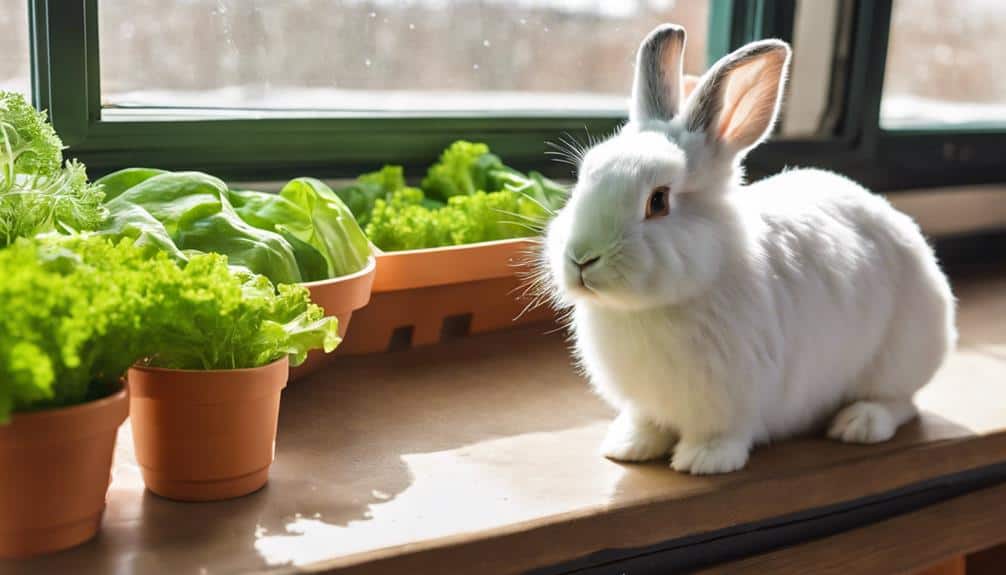
Regular wellness exams and up-to-date vaccines play an important role in maintaining the health of your adopted bunnies. Here are some key aspects to contemplate for the well-being of your furry friends:
- Bunny health check-ups: Schedule regular check-ups with a rabbit-savvy veterinarian to monitor your bunnies' health and catch any potential issues early on.
- Bunny exercise routines: Encourage physical activity by providing ample space for your bunnies to hop around, ensuring they get the exercise they need to stay healthy and happy.
- Bunny dental care tips: Implementing a proper dental care routine is vital for your bunnies' overall health. Offer chew toys and monitor their teeth regularly for any signs of overgrowth or dental problems.
- Preventive measures: Stay proactive by spaying/neutering your bunnies, microchipping them for identification, and following a thorough veterinary care plan that includes vaccinations and parasite prevention.
Avoiding Common Bunny Care Mistakes
To guarantee the best well-being of your beloved bunnies, it's important to be mindful of common mistakes in their care. When it comes to behavior challenges, remember that bunnies can exhibit various behaviors like chewing on furniture or digging in unwanted places. To address this, provide appropriate chew toys and digging boxes to redirect their natural behaviors positively.
Socialization tips are essential for bunnies to thrive. Make sure they've opportunities to interact with you and other household members gently and consistently to build trust and strengthen bonds.
Training techniques can help in managing your bunny's behavior effectively. Use positive reinforcement methods like treats and praise to encourage desired behaviors such as using a litter box or coming when called. Consistency is key in training bunnies, as they respond well to routines and gentle guidance.
Sustaining Bunny Happiness
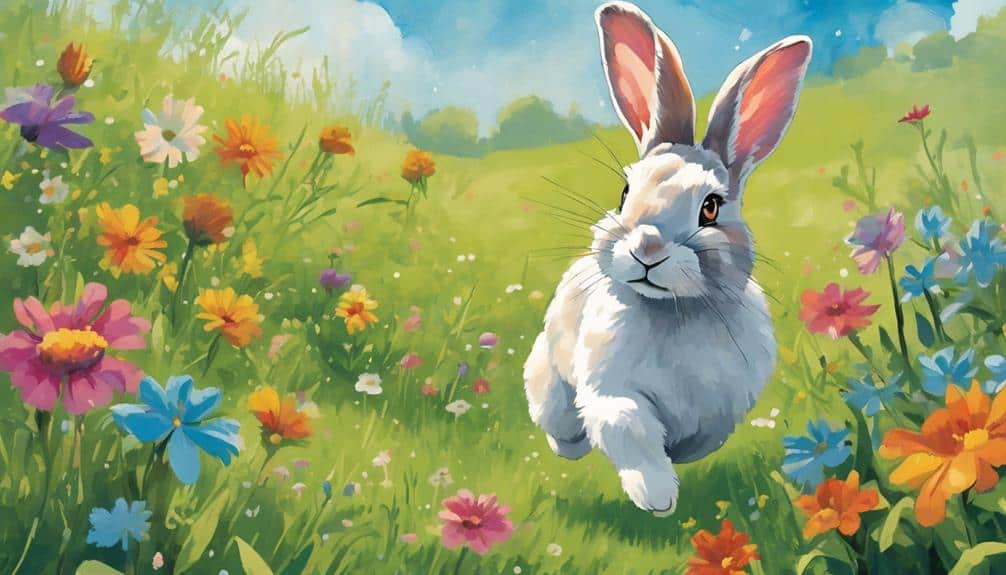
Ensuring sustained happiness for your bunny involves prioritizing their well-being through spaying/neutering, microchipping, and regular wellness check-ups. Here are some essential ways to sustain your bunny's happiness:
- Enrichment activities: Engage your bunny in stimulating activities like puzzle feeders, tunnels, or toys to keep them physically and mentally active, preventing boredom and promoting overall well-being.
- Mental stimulation: Provide your bunny with mental challenges such as hiding treats for them to find or teaching simple tricks. Mental stimulation is vital for their cognitive health and happiness.
- Socialization opportunities: Bunnies are social creatures and benefit from interactions with other bunnies or even gentle human companionship. Arrange playdates or spend quality time bonding with your bunny to make sure they feel loved and secure.
- Regular veterinary care: Schedule routine check-ups with a rabbit-savvy vet to monitor your bunny's health, address any issues early on, and keep them up to date on vaccinations. Prioritizing preventive healthcare is key to sustaining your bunny's happiness and longevity.
Frequently Asked Questions
Can Rabbits Walk Without Hopping?
Yes, rabbits can walk without hopping. While hopping is their primary mode of transportation, they can also walk on all fours at a slower pace. This ability showcases their behavioral flexibility and physical adaptability to different situations.
What Do Rabbits Do?
Rabbits hop energetically, displaying their natural grace and agility. They spend their days nibbling on hay, veggies, and pellets, engaging in activities like digging and communicating through thumping. These social creatures enjoy grooming and forming strong bonds.
What Does a Rabbit Look Like?
You see fluffy ears that can grow up to 4 inches, a twitching nose guiding them, and soft fur in various colors and patterns. Their powerful hind legs for hopping and whiskers for sensing create endearing bunnies.
Conclusion
As you commence on your journey of caring for a bunny, remember that your role is like that of a gentle gardener tending to a delicate flower.
Nurturing, patience, and love will help your bunny bloom into a happy and content companion.
With the right knowledge and care, you can create a harmonious bond that will bring joy and fulfillment to both you and your furry friend.
Happy hopping, and may your bunny's happiness continue to grow in your care.

